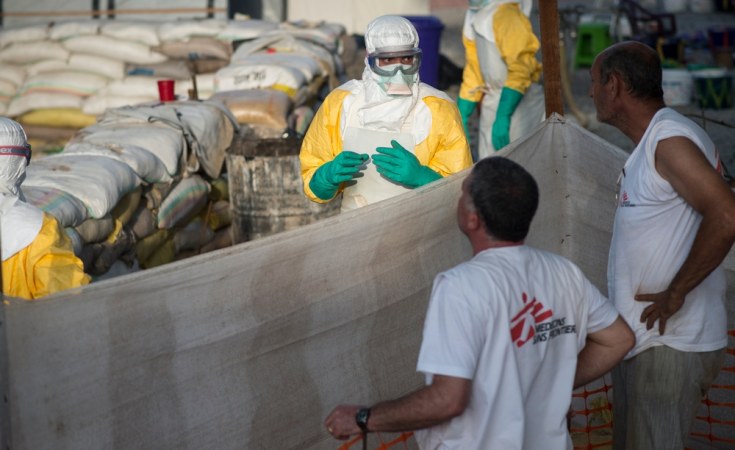The World Health Organization (WHO) says in its latest Ebola report that those dealing with the outbreak in Liberia are so overwhelmed that they cannot keep reliable statistics on its spread. The report also says the high rate of infections across the three countries where it is worst is a cause of "great concern".
The report, for the week ended October 5, says the death toll was 3,879 at that date, with 8,033 cases having been reported in Guinea, Liberia, Nigeria, Senegal, Sierra Leone and the United States. Another case had since been reported in Spain.
"The situation in Guinea, Liberia, and Sierra Leone continues to deteriorate," the report says, "with widespread and persistent transmission of EVD (Ebola virus disease)... There is no evidence that the EVD epidemic in West Africa is being brought under control, though there is evidence of a decline in incidence in the districts of Lofa in Liberia, and Kailahun and Kenema in Sierra Leone."
Ebola in Guinea, Liberia and Sierra Leone continues to show an "upward epidemic trend," WHO says, and transmission in those countries is "widespread and intense".
Ebola spreads in Guinea
In a detailed breakdown, the report says about 100 new cases has been reported in Guinea in the week leading up to October 5. It adds:
"For many weeks the outbreak in Guinea has been driven by transmission in three areas: the capital Conakry, Macenta, and Gueckedou, the region in which the outbreak originated.
"Although the number of reported new confirmed and probable cases in Gueckedou has been stable and low over the past four weeks, with between four and six cases reported each week, the number of new cases reported from Macenta varied between 15 and 71 cases reported each week over the same period. Transmission remains high in Conakry, with 15 new confirmed and probable cases reported in epidemiological week 40.
"The district of N'Zerekore has also reported a marked increase in the number of new cases reported, with 20 reported (in the most recent week). In the east of country, on the border with Côte d'Ivoire, the district of Lola has now reported cases of EVD for the first time (three confirmed cases). The neighboring district of Beyla reported its first confirmed cases the previous week."
Liberia responders "overwhelmed"
A reported fall in new cases in Liberia is unlikely to be accurate, WHO says, "Rather, it reflects a deterioration in the ability of overwhelmed responders to record accurate epidemiological data. It is clear from field reports and first responders that EVD cases are being under-reported from several key locations..."
"Approximately 200 new probable and suspected cases, but very few confirmed cases, have been reported in the capital Monrovia in each of the past three weeks," the report adds.
"A substantial proportion of these suspected cases are most probably genuine cases of EVD, and the reported fall in confirmed cases over the past three weeks reflects delays in matching laboratory results with clinical surveillance data. Efforts continue to urgently address problems with data acquisition in what is an extremely challenging environment, and it is likely that the figures will be revised upwards in due course."
Giving a more detailed picture, the report goes on:
"The district of Margibi continues to report high numbers of new confirmed and probable cases (31 in the past week), while the district of Grand Cape Mount has reported new cases for the first time in three weeks. There continues to be a fall in the number of new cases reported in Lofa, which borders Gueckedou in Guinea, with 12 confirmed and probable cases reported this week compared with 39 the previous week. This appears to be a genuine reduction."
Freetown reports surge in cases
"Nationally, the situation in Sierra Leone continues to deteriorate," says the report, "with an increase in the number of new confirmed cases reported over each of the past seven weeks.
"The capital, Freetown, and the neighbouring districts of Bombali, Port Loko, and Moyamba, have all reported a surge in cases over the past seven to eight weeks.
"The districts of Bo and Tonkolili have also reported an increase in the number of new confirmed and probable cases over the same period. By contrast, a low number of new cases have been reported from Kailahun... and Kenema... for the past four weeks.
"These areas had previously reported high levels of transmission. Reports from responders suggest this fall is a genuine decline in incidence, although further investigation will be required before this can be confirmed."
Infections of healthcare workers cause for concern
The high number of infections in healthcare workers continues to be a cause of great concern, with 401 infected - of whom 232 had died, up to October 5.
Seventy cases in the DR Congo
Seventy cases had been reported in the Democratic Republic of Congo - 30 confirmed, 26 probable and 15 suspected - and 43 deaths, eight of them healthcare workers. The outbreak is not related to that in West Africa, WHO confirmed.
See full WHO report, including detailed statistics and graphs here >>


